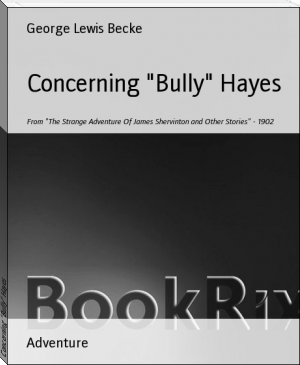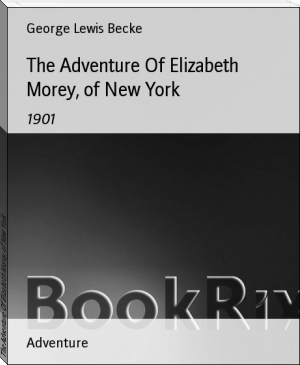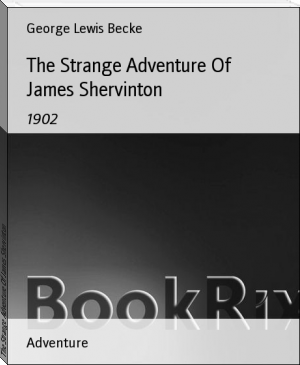Ridan The Devil And Other Stories - George Lewis Becke (free ebooks for android txt) 📗

- Author: George Lewis Becke
Book online «Ridan The Devil And Other Stories - George Lewis Becke (free ebooks for android txt) 📗». Author George Lewis Becke
A few hours later, at low tide, we caught, in the same pool, seven schnapper, averaging about 8 lb. each; a brown groper of 20 lb., a dozen or more of deep sea bream, beautiful silvery-scaled fish, with a pale greenish tinge on the head and back, and bright yellow fins and tail; and several huge cray-fish, which clung to our hooks and did not let go their hold in time.
This pool was only one of many along this picturesque and rocky coast, along which, at the present time, fish are just as plentiful and as easy to catch; but four years ago I, on visiting 'the' pool of my early days, found it filled by a pile of soap-stone rocks, detached by the rains from the sea face of the bluff above it. It was a bitter disappointment to me, for the memory of that pool had remained with me since my boyhood, and I felt as one who, after a long, long separation in foreign climes from some dear friend of his youth, at last returns home, hoping to meet his comrade once more, and is shown his grass-grown grave.
AN ADVENTURE IN THE NEW HEBRIDES
More than twenty years ago a fine young Polynesian half-caste, named Alan, and the writer, were running a small trading cutter out of Samoa, among the low-lying atolls of the Ellice and Tokelau groups, in the South Pacific. We had hauled her up on the beach to clean and put a few sheets of copper on her, when, one day, a big, bronze-faced man came to us, and asked us if we were open to a charter to Santo in the New Hebrides. After a few minutes' conversation we struck a bargain, the terms of which were to take him, his native wife, three servants, and twenty tons of trade goods to his trading station on Espiritu Santo in the New Hebrides, for six hundred dollars. He was an ex-trading skipper, but had given up the sea, married a Hervey Island half-caste, and, after trading some years in the Caroline and Marshall groups, had made a trip to the New Hebrides, where he had gone into partnership with a Frenchman, who, like himself, was a sailor man, and had settled down on Santo. Hannah--for that was his name--had then returned to the Carolines for his family, and brought them to Samoa, from whence he thought he could get a passage down to the New Hebrides in one of the two German brigs then engaged in the Kanaka labour trade--'black-birding,' as it was called. But one, the _Iserbrook_ had been burnt in Sydney Harbour, and the other was away at Valparaiso.
But now arose a difficulty. I was not navigator enough to take the vessel to Santo--a distance of thirteen hundred miles--let alone beat her back to Samoa against the south-east trades. This, however, Captain Hannah soon settled. He agreed to navigate us down, and his partner would come back with me, as his wife, who was a Samoan woman, wanted to pay a visit to her native country, and our vessel would afford her an excellent opportunity; his own services in bringing the cutter back to Samoa to be 'squared' by free passages for himself and wife.
My partner Alan was quite satisfied. The big man planked down two hundred and fifty dollars on account, and we shook hands all round. Hannah was a quiet, silent sort of fellow, but I knew we should get on all right, for he came down to us next morning with his people, helped us heave the cutter off the beach, and covered our decks with pigs and poultry. That afternoon we got our wood and water aboard, and were ready for sea at daylight.
Alan was a splendid type of a man. Brought up to the sea from his childhood, he had served some years as a boat-steerer on American whale-ships, then with 'Bully' Hayes as boatswain in the notorious _Rona_ brig; and a finer seaman never walked a deck. He was very proud of the English blood in his veins, and always talking of the exploits of his father, who had served with the gallant Cochrane in the Chilian navy. At sea he was a man for emergencies--quick, resolute, resourceful and sober. On shore, with money in his pocket, he descended to the level of the lowest beach-comber, and was always in trouble for thumping somebody--generally another half-caste or a policeman. Peace to his bones! He went to a sailor's death long ago; but the writer of this narrative will never forget the dark, handsome face, laughter-filled eyes, and cheery voice of the best shipmate with whom he ever sailed.
We put to sea with a fine breeze, and running between the islands of Upolu and Savai'i, were out of sight of land by dusk. There were but thirteen persons all told on board--our seven passengers, Alan, four native sailors, and myself--but we were in no wise crowded for room, for the hold was used as a sleeping-place by Captain Hannah's wife, her two children and three servants. Mats had been spread over the cargo, and the weather being fine, the hatch was left open from the time we left Samoa nearly till we reached Santo.
The south-east trade wind held steadily, and the little vessel, being clean and in fine trim, ran along at a great rate, till, on the sixth day out, when we had just sighted Pentecost Island, one of the New Hebrides group, it died away, and at sunset we were becalmed. All that night the air was close and muggy, but towards dawn a faint air came from the westward. During the night the strong current had carried us in ten or twelve miles nearer to the shore, and at sunrise we were not more than six miles from the land. Pentecost, from the treachery of its savage inhabitants, had always borne a bad reputation; and so, as the cutter still continued to drift shorewards, Alan, Captain Hannah and myself thought it just as well to be prepared for any canoes that might attempt to cut us off. (As-a matter of fact, however, we need not have been under any alarm in this respect, for although the Pentecost natives were, and are now, a thoroughly bad lot, as the surveying vessels of the Australian Squadron know to their cost, they would never attempt to cut off a vessel unless she were anchored. But no one of we white men knew much of the New Hebrides.) So as we had plenty of arms on board--Winchesters and Sharp's rifles--We got them in readiness; and very fortunate it was that we did so.
We drifted steadily along the densely-wooded shores of Pentecost all that day, the sea as smooth as glass, and the pitch bubbling up in the decks from the intense heat. Towards sunset, Captain Hannah's wife, who was lying on the skylight with her youngest child, called out to us that she could see a boat or canoe on the starboard beam. Hannah and I at once got our glasses, and soon made out a boat, pulling five oars, coming towards us from the island, and not more than a couple of miles away.
As she came nearer, and lifted now and then to the swell, we obtained a better view, and saw there were six people in her--five pulling and one steering. They came along very leisurely.
'Shipwrecked people, I imagine,' said Hannah; and then, turning to Alan and myself, he added, with a laugh, 'Perhaps there's a fine big lump of a ship ashore about here, and you fellows are bound to get some fine pickings--might get the ship herself afloat.'
In ten minutes or so a bit of a light air came over the water, and filled our sails, so we stood over towards the boat, which was now drawing close. Presently one of our native sailors hailed us from aloft, and said he could see four or five more men in the boat besides those who were pulling; and at the same time she ceased rowing awhile, then the oars dipped again, and she came on.
Suddenly Hannah, who was scanning the strange boat very closely, turned to me quietly and said, 'I don't like the looks of that boat. We had better not let them come alongside. Perhaps they're escapees from New Caledonia. I thought so at first--they've got the regular "Ile Nou stroke." If they try to board we must beat them off, or we may lose the ship.'
Realising the





Comments (0)